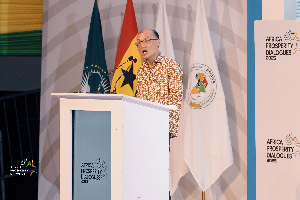Accra, Aug. 20, GNA - The Volta River Authority (VRA) is expressing fears that the rising level of water along the banks of the White Volta and Oti rivers would cause the spread of water hyacinth, which would have negative impact on biological diversity, agriculture and human development.
Mr Michael Dade, Principal Research Officer of VRA, told the Ghana News Agency in Accra that the expected heavy rains will not only cause floods but also affect the health of the people living along the two rivers.
He said the upsurge of the hyacinth would affect fisheries and shoreline activities especially at Dambai in northern Volta Region. Water hyacinth is the most dangerous waterweed in the world and has been known in Ghana since 1984. It is a floating weed with attractive looking purple flowers with a dark yellow mid-section. It grows fast reaching a height of about two meters and spreads rapidly to cover the surface of water bodies and could be rooted in muddy bottoms and reproduce through seeds and stolons.
"Each water hyacinth weed is capable of producing about 5,000 seeds which could survive in the water for up to 15 years. It is able to spread quickly over the surface of water to cover twice its initial area in just two weeks."
Water hyacinth prevents movements of boats, canoes and hinders transportation on water and hampers commercial activities such as carrying of foodstuff, goods and services on water bodies. He noted that water hyacinth was so dangerous that it inhibited the use of a variety of fishing gear and reduced fish landed. It also blocks pipes and inlets at water intake points thus reducing water supply for domestic use, irrigation and hydro-power generation.
"This destructive water weed could cause rapid evapo-transpiration, water loss and quick drying of water bodies. It also covers surfaces of water bodies thereby preventing oxygen from dissolving in the water for aquatic life." Mr Dade called on communities long the Oti and White Volta to remove the plant from the water to dry and burn them or report to the District Assembly, Ministry of Food and Agriculture or the Environmental Protection Agency.
General News of Wednesday, 20 August 2008
Source: GNA
















